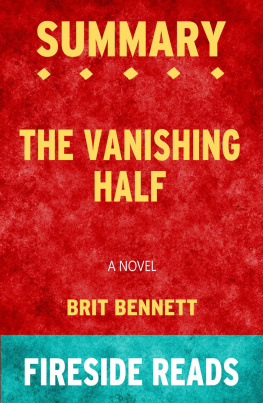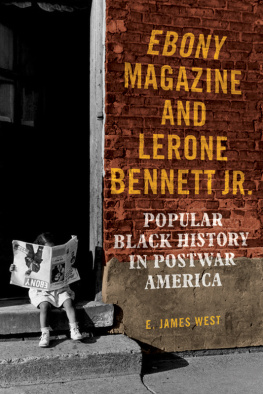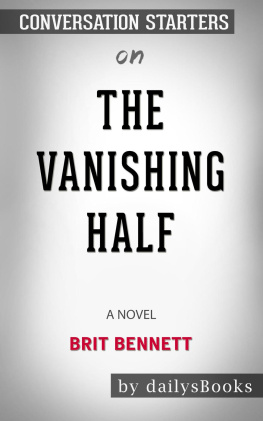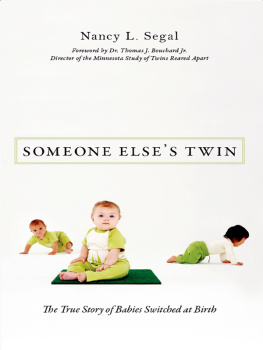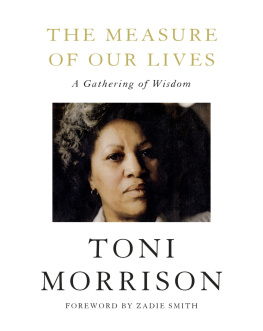RIVERHEAD BOOKS
An imprint of Penguin Random House LLC
penguinrandomhouse.com
Copyright 2020 by Brittany Bennett
Penguin supports copyright. Copyright fuels creativity, encourages diverse voices, promotes free speech, and creates a vibrant culture. Thank you for buying an authorized edition of this book and for complying with copyright laws by not reproducing, scanning, or distributing any part of it in any form without permission. You are supporting writers and allowing Penguin to continue to publish books for every reader.
Library of Congress Cataloging-in-Publication Data
Names: Bennett, Brit, author.
Title: The vanishing half / Brit Bennett.
Description: New York : Riverhead Books, 2020.
Identifiers: LCCN 2020005358 (print) | LCCN 2020005359 (ebook) | ISBN 9780525536291 (hardcover) | ISBN 9780525536970 (ebook)
Subjects: GSAFD: Mystery fiction.
Classification: LCC PS3602.E66444 V36 2020 (print) | LCC PS3602.E66444 (ebook) | DDC 813/.6--dc23
LC record available at https://lccn.loc.gov/2020005358
LC ebook record available at https://lccn.loc.gov/2020005359
International edition ISBN: 9780593190197
This is a work of fiction. Names, characters, places, and incidents either are the product of the authors imagination or are used fictitiously, and any resemblance to actual persons, living or dead, businesses, companies, events, or locales is entirely coincidental.
Cover design and art: Lauren Peters-Collaer
pid_prh_5.5.0_c0_r0
For my family
CONTENTS
Cover
Title Page
Copyright
Dedication
Part I: The Lost Twins (1968)
One
Two
Three
Part II: Maps (1978)
Four
Five
Six
Part III: Heartlines (1968)
Seven
Eight
Nine
Part IV: The Stage Door (1982)
Ten
Eleven
Twelve
Thirteen
Part V: Pacific Cove (1985/1988)
Fourteen
Fifteen
Part VI: Places (1986)
Sixteen
Seventeen
Acknowledgments
About the Author
Part I
THE LOST TWINS(1968)
One
The morning one of the lost twins returned to Mallard, Lou LeBon ran to the diner to break the news, and even now, many years later, everyone remembers the shock of sweaty Lou pushing through the glass doors, chest heaving, neckline darkened with his own effort. The barely awake customers clamored around him, ten or so, although more would lie and say that theyd been there too, if only to pretend that this once, theyd witnessed something truly exciting. In that little farm town, nothing surprising ever happened, not since the Vignes twins had disappeared. But that morning in April 1968, on his way to work, Lou spotted Desiree Vignes walking along Partridge Road, carrying a small leather suitcase. She looked exactly the same as when shed left at sixteenstill light, her skin the color of sand barely wet. Her hipless body reminding him of a branch caught in a strong breeze. She was hurrying, her head bent, andLou paused here, a bit of a showmanshe was holding the hand of a girl, seven or eight, and black as tar.
Blueblack, he said. Like she flown direct from Africa.
Lous Egg House splintered into a dozen different conversations. The line cook wondered if it had been Desiree after all, since Lou was turning sixty in May and still too vain to wear his eyeglasses. The waitress said that it had to beeven a blind man could spot a Vignes girl and it certainly couldnt have been that other one. The diners, abandoning grits and eggs on the counter, didnt care about that Vignes foolishnesswho on earth was the dark child? Could she possibly be Desirees?
Well, who elses could it be? Lou said. He grabbed a handful of napkins from the dispenser, dabbing his damp forehead.
Maybe its an orphan that got took in.
I just dont see how nothin that black coulda come out Desiree.
Desiree seem like the type to take in no orphan to you?
Of course she didnt. She was a selfish girl. If they remembered anything about Desiree, it was that and most didnt recall much more. The twins had been gone fourteen years, nearly as long as anyone had ever known them. Vanished from bed after the Founders Day dance, while their mother slept right down the hall. One morning, the twins crowded in front of their bathroom mirror, four identical girls fussing with their hair. The next, the bed was empty, the covers pulled back like any other day, taut when Stella made it, crumpled when Desiree did. The town spent all morning searching for them, calling their names through the woods, wondering stupidly if they had been taken. Their disappearance seemed as sudden as the rapture, all of Mallard the sinners left behind.
Naturally, the truth was neither sinister nor mystical; the twins soon surfaced in New Orleans, selfish girls running from responsibility. They wouldnt stay away long. City living would tire them out. Theyd run out of money and gall and come sniffling back to their mothers porch. But they never returned again. Instead, after a year, the twins scattered, their lives splitting as evenly as their shared egg. Stella became white and Desiree married the darkest man she could find.
Now she was back, Lord knows why. Homesick, maybe. Missing her mother after all those years or wanting to flaunt that dark daughter of hers. In Mallard, nobody married dark. Nobody left either, but Desiree had already done that. Marrying a dark man and dragging his blueblack child all over town was one step too far.
In Lous Egg House, the crowd dissolved, the line cook snapping on his hairnet, the waitress counting nickels on the table, men in coveralls gulping coffee before heading out to the refinery. Lou leaned against the smudged window, staring out at the road. He ought to call Adele Vignes. Didnt seem right for her to be ambushed by her own daughter, not after everything shed already been through. Now Desiree and that dark child. Lord. He reached for the phone.
You think they fixin to stay? the line cook asked.
Who knows? She sure seem in a hurry though, Lou said. Wonder what she hurryin to. Look right past me, didnt wave or nothin.
Uppity. And what reason she got to be uppity?
Lord, Lou said. I never seen a child that black before.
IT WAS A strange town.
Mallard, named after the ring-necked ducks living in the rice fields and marshes. A town that, like any other, was more idea than place. The idea arrived to Alphonse Decuir in 1848, as he stood in the sugarcane fields hed inherited from the father whod once owned him. The father now dead, the now-freed son wished to build something on those acres of land that would last for centuries to come. A town for men like him, who would never be accepted as white but refused to be treated like Negroes. A third place. His mother, rest her soul, had hated his lightness; when he was a boy, shed shoved him under the sun, begging him to darken. Maybe thats what made him first dream of the town. Lightness, like anything inherited at great cost, was a lonely gift. Hed married a mulatto even lighter than himself. She was pregnant then with their first child, and he imagined his childrens childrens children, lighter still, like a cup of coffee steadily diluted with cream. A more perfect Negro. Each generation lighter than the one before.
Soon others came. Soon idea and place became inseparable, and Mallard carried throughout the rest of St. Landry Parish. Colored people whispered about it, wondered about it. White people couldnt believe it even existed. When St. Catherines was built in 1938, the diocese sent over a young priest from Dublin who arrived certain that he was lost. Didnt the bishop tell him that Mallard was a colored town? Well, who were these people walking about? Fair and blonde and redheaded, the darkest ones no swarthier than a Greek? Was this who counted for colored in America, who whites wanted to keep separate? Well, how could they ever tell the difference?
Next page


